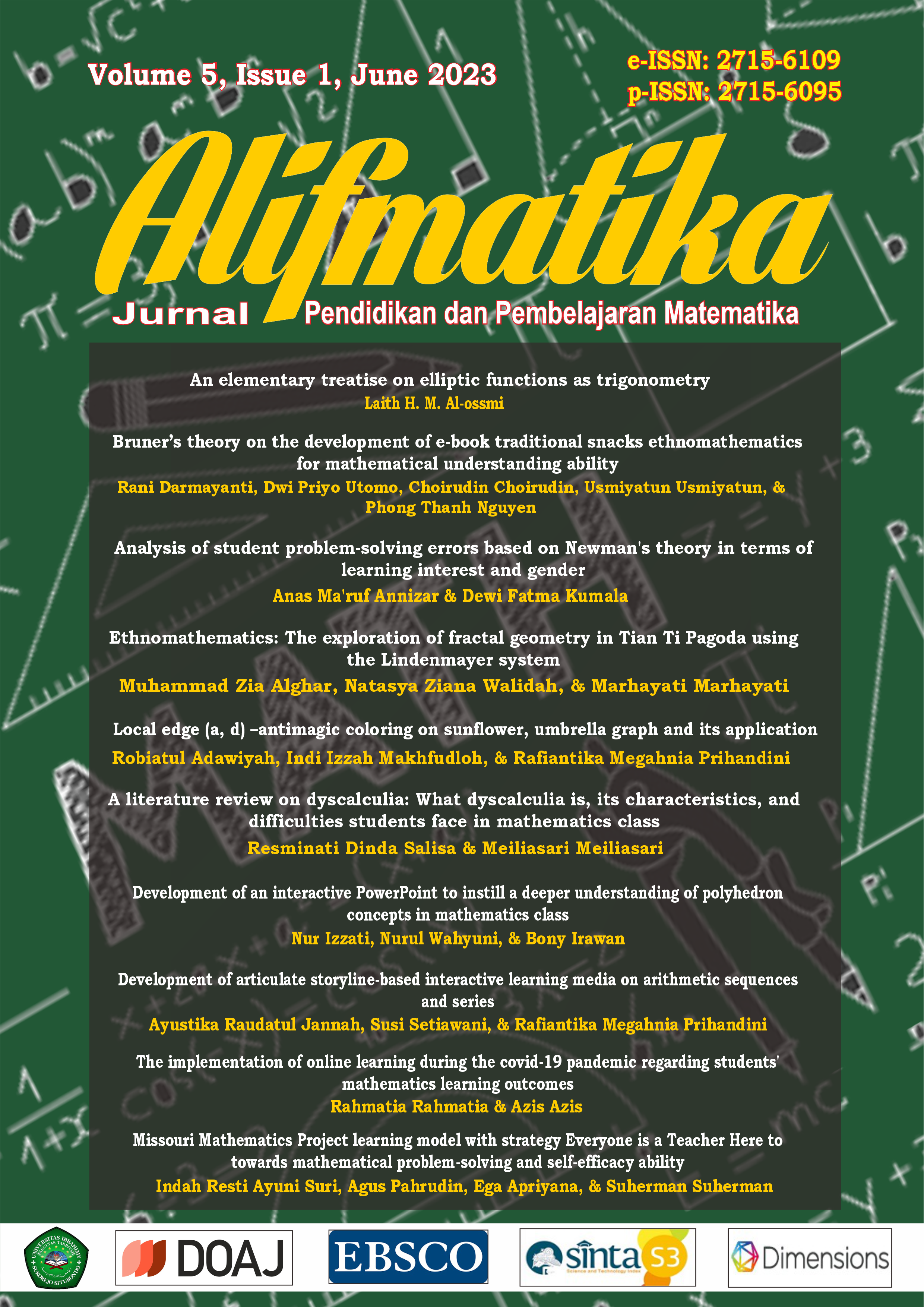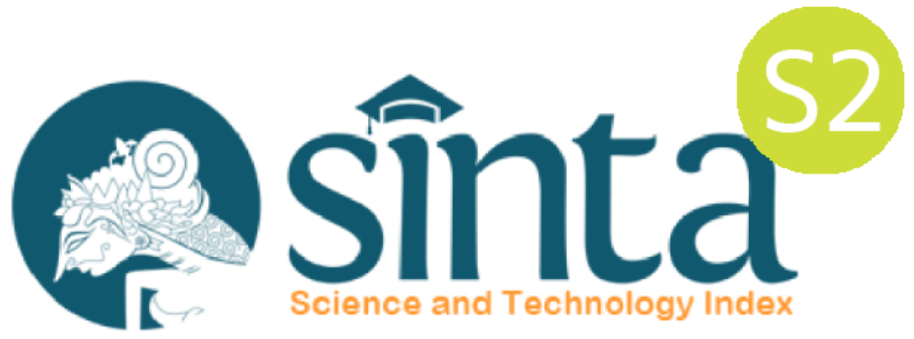Analysis of student problem-solving errors based on Newman's theory in terms of learning interest and gender
DOI:
https://doi.org/10.35316/alifmatika.2023.v5i1.40-56Keywords:
Interest in Learning, Newman's theory, Gender, Problem-solving, Solving ErrorsAbstract
Errors often occurred when students solve mathematical problems solving, exceedingly when students are faced with contextual story problems. Newman's procedural error analysis classified errors in solved story problems into five categories: reading errors, encoding errors, transformation errors, comprehension errors, and processing skill errors. There were several factors on errors worked by students when solving problems, such as student interest in learning and gender differences. This study aims to describe the problem-solving errors of students, both men, and women, who have high, medium, and low interest in learning to solve story problems on SPLTV material. According to the Newman’s procedure. The research type is a qualitative approach with descriptive. And the research subjects were obtained by using a purposive sampling technique. The results of this study include 1) Students of high interest in learning and are making Encoding Errors, and Processing Skill Errors, while students with low interest in learning make Processing Skill Errors, Transformation Errors, and Encoding Errors. 2) Students with a great interest in learning and making encoding errors and processing skills errors. Students with low interest made Comprehension Errors, Encoding Errors, Processing Skill errors, and Transformation Errors.
Downloads
References
Amador, R. M. (2022). Reading comprehension, attitude, and error patterns in solving word problems in mathematics. Journal of Elementary Education. Vol, 11(2), 36–42. http://article.ijoee.net/pdf/10.11648.j.ijeedu.20221102.13.pdf
Annizar, A. M., & Arifin, M. (2021). Perbedaan prestasi belajar mahasiswa ditinjau dari jalur seleksi masuk perguruan tinggi [Differences in student learning achievement viewed from the higher education entrance selection path]. SAP (Susunan Artikel Pendidikan)/ OEA (Organization of Educational Articles), 5(3), 197–204. https://doi.org/10.30998/sap.v5i3.8411
Annizar, A. M., Kholida, A., Alfitria, A., & Yusuf, A. Su. (2021). Pengembangan LKS trigonometri berbasis etnomatematika pada Masjid Cheng-Ho di Kabupaten Jember [Development of ethnomathematics-based trigonometry worksheets at the Cheng-ho mosque in Jember Regency]. Buana Matematika: Jurnal Ilmiah Matematika Dan Pendidikan Matematika/Buana Mathematics: Scientific Journal of Mathematics and Mathematics Education, 11(1), 69–88. 10.36456/buanamatematika.v11i1.3564
Annizar, A. M., Lestari, A. C., Dalimarta, S., & Wulandari, Y. N. (2021). The process of student analytical thinking in understanding and applying lattice method to solve mathematical problem. Journal of Physics: Conference Series, 1836(1), 1-10. https://doi.org/10.1088/1742-6596/1836/1/012047
Annizar, A. M., Lestari, A. C., Sofiah, Khairunnisa, G. F., & Maulyda, A. M. (2020). Proses berpikir inkuiri dalam menyelesaikan masalah higher order thinking skills (HOTS) ditinjau dari tingkat kognitif [Process of inquiry thinking in solving higher order thinking skills (HOTS) problems in the view from a cognitive level]. Aksioma: Jurnal Program Studi Pendidikan Matematika/Axiom: Journal of the Mathematics Education Study Program, 9(4), 1192–1204. https://doi.org/10.24127/ajpm.v9i4.3113
Annizar, A. M., & Zahro, F. S. (2020). Proses berpikir metafora dalam menyelesaikan masalah matematis soal hots berdasarkan kemampuan kognitif siswa [Metaphoric thinking process in solving hots mathematical problems based on students' cognitive abilities]. Jurnal Tadris Matematika/Journal of Tadris Mathematics, 3(2), 117–130. https://doi.org/10.21274/jtm.2020.3.2.117-130
Apriyono, F. (2016). Profil kemampuan koneksi matematika siswa SMP dalam memecahkan masalah matematika ditinjau dari gender [Profile of Junior High School students' mathematical connection ability in solving mathematical problems in view of gender]. Jurnal Pendidikan Matematika STKIP Garut/Journal of Mathematics Education STKIP Garut, 5(2), 159–168. https://doi.org/10.31980/mosharafa.v5i2.271
Creswell, J. W. (2012). Educational research:planning, conducting and evaluating, quantitative and qualitative research. fourth edition. Pearson Education, Inc. http://nuir.nkumbauniversity.ac.ug/handle/20.500.12383/985
Emanuel, E. P. L., Kirana, A., & Chamidah, A. (2021). Enhancing students’ ability to solve word problems in mathematics. Journal of Physics: Conference Series, 1832(1), 1–10. https://doi.org/10.1088/1742-6596/1832/1/012056
Harniati, E., Jeharut, M., Hariyani, S., & Wulandari, T. C. (2019). Analisis kesalahan menyelesaikan soal cerita berdasarkan tahapan newman ditinjau dari gender [Error analysis of solving story problems based on Newman's stages in terms of gender]. Seminar Nasional FST 2019 Universitas Kanjuruhan Malang/National Seminar FST 2019 Kanjuruhan University of Malang, 2(1), 575–582. https://conference.unikama.ac.id/artikel/index.php/senastek/article/view/160
Ilhan, A., & Akin, M. F. (2022). Analysis of contextual problem solutions, mathematical sentences, and misconceptions of pre-service mathematics teachers. International Electronic Journal of Mathematics Education, 17(1), 1–14. https://doi.org/10.29333/iejme/11470
Islamiyah, A. C., Prayitno, S., & Amrullah, A. (2018). Analisis kesalahan siswa SMP pada penyelesaian masalah sistem persamaan linear dua variabel [Analysis of junior high school students' errors in solving two-variable linear equation systems problems]. Jurnal Didaktik Matematika/Journal of Mathematics Didactics, 5(1), 66–76. https://doi.org/10.24815/jdm.v5i1.10035
Khairunnisa, G. F., Maulyda, M. A., Annizar, A. M., Hijriani, L., & Khair, M. S. (2020). Mathematics communication: Translation of elementary students’ idea. Numerical: Jurnal Matematika dan Pendidikan Matematika, 4(2), 77–86. https://doi.org/10.25217/numerical.v4i2.781
Kharis, S. A. A., Salsabila, E., & Haeruman, L. D. (2021). Effect of mathematical concept understanding and mathematical reasoning on mathematical literacy abilities. Journal of Physics: Conference Series, 1747(1), 1–8. https://doi.org/10.1088/1742-6596/1747/1/012042
Lestari, A. C. (2021). Analisis kesalahan siswa dalam menyelesaikan masalah literasi matematika ditinjau dari tingkat kognitif siswa kelas IX di MTs Negeri 1 Jember [Analysis of student errors in solving mathematical literacy problems given the cognitive level of grade IX students at MTs Negeri 1 Jember]. Fakultas Tarbiyah dan Ilmu Keguruan Program Studi Tadris Matematika. http://digilib.uinkhas.ac.id/5837/
Machromah, I. U., Eriska, M., Purnomo, R., & Tengah, J. (2017). Process skill error: The majority student’s error in problem solving of integral calculus. J. Daya Matemtis, 5(1), 358–376.
Magen-Nagar, N. (2016). Examining teaching based on errors in mathematics amongst pupils with learning disabilities. European Journal of Science and Mathematics Education, 4(4), 506–522. https://www.scimath.net/download/examining-teaching-based-on-errors-in-mathematics-amongst-pupils-with-learning-disabilities-9490.pdf
Masruroh, S. H., Annizar, A. M., Azizah, N. I., & Kamila, O. R. (2021). Pengembangan lembar kerja siswa berbasis pendekatan saintifik dalam materi garis singgung lingkaran kelas VIII [Development of student worksheets based on a scientific approach in class VIII class circle tangent material]. Aritmatika: Jurnal Riset Pendidikan Matematika/Arithmetic: Journal of Mathematics Education Research, 2(1), 57–66. https://aritmatika.iain-jember.ac.id/index.php/arm/article/view/66
Prakitipong, N., & Nakamura, S. (2006). Analysis of mathematics performance of grade five students in thailand using Newman procedure. Journal of International Cooperation in Education, 9(1), 111–122. https://cir.nii.ac.jp/crid/1390853649787030912
Presiden Republik Indonesia, P. (2003). Undang-undang republik Indonesia nomor 20 tahun 2003 tentang sistem pendidikan nasional [Law of the republic of Indonesia number 20 of 2003 concerning the national education system]. https://pusdiklat.perpusnas.go.id/regulasi/download/6
Ramaley, J. A. (2007). Aims of mathematics education. Assessing Mathematical Proficiency, 53(3), 17–22. https://doi.org/10.1017/CBO9780511755378.004
Sakdiyah, H., & Annizar, A. M. (2021). Pengembangan LKPD berbasis kearifan lokal masyarakat pesisir pantai puger pada materi perbandingan [Development of lkpd based on local wisdom of the coastal pager communities on comparative materials]. Aritmatika: Jurnal Riset Pendidikan Matematika/Arithmetic: Journal of Mathematics Education Research, 2(2), 116–124. https://aritmatika.iain-jember.ac.id/index.php/arm/article/view/69
Shinariko, L. J., Saputri, N. W., Hartono, Y., & Araiku, J. (2020). Analysis of students’ mistakes in solving mathematics olympiad problems. Journal of Physics: Conference Series, 1480(1), 1–8. https://doi.org/10.1088/1742-6596/1480/1/012039
Suandito, B. (2017). Bukti informal dalam pembelajaran matematika [Informal evidence in mathematics learning]. Al-Jabar: Jurnal Pendidikan Matematika/Al-Jabar: Journal of Mathematics Education, 8(1), 13–24. https://doi.org/10.24042/ajpm.v8i1.1160
Subakri, S., & Annizar, A. M. (2021). The effects of covid-19 in learning: Effective and efficient online learning models of mathematical statistics and real analysis from the students’ perspective. Journal of Physics: Conference Series, 1836(1), 12048. https://doi.org/10.1088/1742-6596/1836/1/012048
Topa, S. I. (2019). Analisis Kesalahan Siswa Kelas X SMAN Jenggawah dalam Menyelesaikan Permasalahan Fungsi Eksponen ditinjau dari Gender [Error analysis of class X students of SMAN Janggawah in solving problems of exponential functions in terms of gender]. University of Jember. https://repository.unej.ac.id/handle/123456789/100032
White, A. L. (2010). Numeracy, literacy, and Newman’s error analysis. Journal of Science and Mathematics, 33(2), 129–148. https://researchdirect.westernsydney.edu.au/islandora/object/uws:26023/
Wong, S. L., & Wong, S. L. (2019). Relationship between interest and mathematics performance in a technology-enhanced learning context in Malaysia. Research and Practice in Technology Enhanced Learning, 14(21), 1–13. https://doi.org/10.1186/s41039-019-0114-3
Downloads
Published
How to Cite
Issue
Section
License
COPYRIGHT NOTICE
Author (s) who publish in Alifmatika: Jurnal Pendidikan dan Pembelajaran Matematika agree to the following terms:
- The Author (s) submitting a manuscript do so on the understanding that if accepted for publication, copyright of the article shall be assigned to Alifmatika: Jurnal Pendidikan dan Pembelajaran Matematika, Tarbiyah Faculty of Ibrahimy University as the publisher of the journal. Consecutively, author(s) still retain some rights to use and share their own published articles without written permission from Alifmatika: Jurnal Pendidikan dan Pembelajaran Matematika. This work is licensed under a Creative Commons Attribution-ShareAlike 4.0 International License.
- Copyright encompasses rights to publish and provide the manuscripts in all forms and media for the purpose of publication and dissemination, and the authority to enforce the rights in the manuscript, for example in the case of plagiarism or in copyright infringement.
- Alifmatika: Jurnal Pendidikan dan Pembelajaran Matematika and the Editors make every effort to ensure that no wrong or misleading data, opinions or statements be published in the journal. In any way, the contents of the articles and advertisements published in Alifmatika: Jurnal Pendidikan dan Pembelajaran Matematika are the sole responsibility of their respective authors and advertisers.
- The Copyright Transfer Form can be downloaded here [Copyright Transfer Form Alifmatika]. The copyright form should be signed originally and send to the Editorial Office in the form of original mail, scanned document to alifmatika[at]ibrahimy.ac.id or upload the scanned document in the comments column when sending the manuscript.























_by_Matematohir.jpg)






